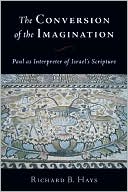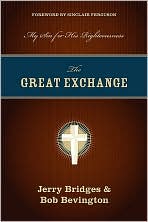
My enthusiasm over this volume has caused me to repeatedly defer writing this review. Both the church and the academy will benefit from the approach to interpretation advocated in this book. Richard B. Hays is well known for stimulating vigorous discussion of two topics. One of these was catalyzed by his remarkably influential dissertation, The Faith of Jesus Christ, and the other by his book Echoes of Scripture in the Letters of Paul. The collection of essays now grouped under the title The Conversion of the Imagination, as the subtitle indicates, carries forward the thesis of Echoes of Scripture.
In the opening paragraph of the introduction Hays articulates the three theses advanced here: “(1) the interpretation of Israel’s Scritpure was central to the apostle Paul’s thought; (2) we can learn from Paul’s example how to read Scripture faithfully; (3) if we do follow his example, the church’s imagination will be converted to see both Scripture and the world in a radically new way” (viii). The first and third of these flow from the second, from which controversy erupts.
Those who follow Hays and pursue what he articulates in the introduction, “Learning from Paul How to Read Israel’s Scripture,” will find their reading of the OT revolutionized. Against the view that Paul uses proof texts from the OT without regard to the original contexts of the statements he quotes, Hays argues that Paul has read the OT carefully, sees it typologically prefiguring Christ and the church, and, perhaps most significantly, resurrection lenses focus his eyes on the text of the OT. According to Hays, in his reading of the OT, Paul has undergone a “conversion of the imagination.”
Hays has refined his earlier discussion of helpful criteria for discerning the presence of OT “echoes” in NT texts, and this appears in chapter 2. He also sets forth an exciting and persuasive case for the view that “Christ Prays the Psalms” (the title of the 6th chapter). This interpretation develops the implications of Romans 15:3, where Paul—without comment—“attributes the words of the Psalm directly to Christ” (102–103). Hays shows that the same technique is used elsewhere in the NT (e.g., John 2:17; 19:28; Mark 15:24; Heb 2:10–12; 10:5–7), and explains that “the earliest church read the psalms as the Messiah’s prayer book . . . . because they read all the promises of an eternal kingdom for David and his seed typologically” (110). Further, “‘David in these psalms becomes a symbol for the whole people and—at the same time—a prefiguration of the future Anointed One” (111).
A number of prominent scholars responded to Echoes of Scripture in a special session on the book at SBL in 1990, and Hays’s response on that occasion is valuably included as chapter 9, allowing those of us who were in high school at that time to catch up on what we missed. The gathered implications of these essays are brought together in chapter 10, “A Hermeneutic of Trust.” In this profoundly encouraging chapter Hays argues that “Our minds must be transformed by grace, and that happens nowhere more powerfully than through reading Scripture receptively and trustingly with the aid of the Holy Spirit” (198). Against the hermeneutics of skepticism and suspicion so prevalent in the academy Hays cites the words of his colleague at Duke, Frank Lentricchia, which bear repeating here:
It is impossible, this much is clear, to exaggerate the heroic self-inflation of academic literary criticism. . . . The fundamental, if only implied, message of much literary criticism is self-righteous, and it takes this form: “T. S. Eliot is a homophobe and I am not. Therefore, I am a better person than Eliot. Imitate me, not Eliot.” To which the proper response is: “But T. S. Eliot could really write, and you can’t. Tell us truly, is there no filth in your soul?” (199).
These searching words are to be pondered.
There are aspects of the volume that I do not appreciate so much, such as the lingering endorsement of E. P. Sanders’ now widely questioned conclusions expressed in his Paul and Palestinian Judaism. And I would not put it the way Hays does when he writes, “Cases may arise in which we must acknowledge internal tensions within Scripture that require us to choose guidance from one biblical witness and reject another. Because the witness of Scripture itself is neither simple nor univocal, the hermeneutics of trust is necessarily a matter of faithful struggle to hear and discern” (198). No examples are given, so it is difficult to know what Hays has in mind, but perhaps a word other than “reject” with reference to Scripture could have been chosen. These concerns noted, this reviewer finds the main thesis of The Conversion of the Imagination compelling, exciting, and suggestive.
The author’s style is elegant throughout, and often his language is pleasantly decked with overtones of great literature. Hays has not only soaked his mind in the canon of Scripture, the text is sprinkled with illustrations from the canon of the western literary tradition (see the discussion of the allusions to Augustine’s Confessions in Eliot’s The Waste Land, pp. 32–33). May we join this scholar, who knows how to read and write, in the reading of both canons, and may God convert our imaginations as we learn from Paul how the OT is to be read.




